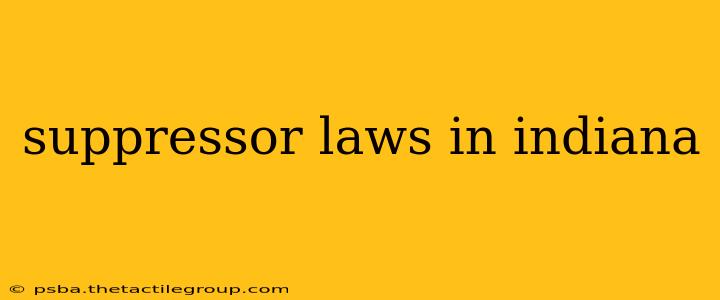Indiana's laws regarding firearm suppressors, also known as silencers, can be complex. This guide aims to provide a clear and concise overview for Indiana residents interested in owning and using suppressors legally. Disclaimer: This information is for educational purposes only and should not be considered legal advice. Always consult with legal counsel or refer to the official Indiana Code for the most up-to-date and accurate information.
What are the Indiana Laws Regarding Suppressor Ownership?
Indiana is a relatively permissive state when it comes to suppressor ownership. Unlike some states with stringent regulations, Indiana follows federal laws regarding the purchase and possession of firearm suppressors. This means you must adhere to both federal and state regulations.
Federal Regulations:
- Bureau of Alcohol, Tobacco, Firearms and Explosives (ATF) Registration: All suppressors must be registered with the ATF through a thorough background check and approval process. This involves completing ATF Form 4 and paying the associated tax stamp fee. The waiting period can be substantial.
- National Firearms Act (NFA): The NFA governs the manufacturing, transfer, and possession of suppressors. Understanding the NFA's requirements is crucial for legal compliance.
Indiana State Regulations:
Indiana does not have additional state-level restrictions beyond the federal requirements. This means there are no state-specific permits or licensing processes needed for owning a suppressor in Indiana, beyond what is mandated at the federal level. However, it's critical to understand that local ordinances might exist in specific cities or counties that could impose further limitations. Always check with local law enforcement for any potential restrictions in your area.
Purchasing a Suppressor in Indiana: A Step-by-Step Guide
The process of legally acquiring a suppressor in Indiana mirrors the federal process:
- Find a Licensed Dealer: You must purchase a suppressor from a licensed firearms dealer registered with the ATF.
- Complete ATF Form 4: This form requires detailed personal information, including fingerprints and photographs. Errors on this form can cause significant delays or rejection.
- Background Check: A thorough background check will be conducted by the ATF. This is a crucial step and any disqualifying factors will prevent approval.
- Tax Stamp Payment: A substantial tax stamp fee is required as part of the registration process.
- Waiting Period: Expect a significant waiting period, often several months, for ATF approval.
- Possession: Once the ATF approves your application and you receive your tax stamp, you can legally take possession of your suppressor.
Important Considerations for Indiana Residents:
- Storage: Indiana law requires firearm owners to store firearms securely to prevent unauthorized access. This applies to suppressors as well.
- Transportation: Suppressor transportation is subject to federal and state laws. Ensure you comply with all regulations.
- Use: The use of suppressors is generally permissible in Indiana, provided you comply with all other applicable hunting and firearm laws. Always check local regulations before using a suppressor on private or public land.
Staying Updated on Indiana Suppressor Laws
Laws can change, so staying informed is vital. Regularly check the Indiana Code and the ATF website for the most current information. Consulting with a legal professional specializing in firearms law is always advisable if you have any questions or concerns about Indiana suppressor regulations.
This guide aims to provide a foundational understanding of Indiana suppressor laws. Remember, responsible firearm ownership includes staying informed and adhering to all applicable regulations.

